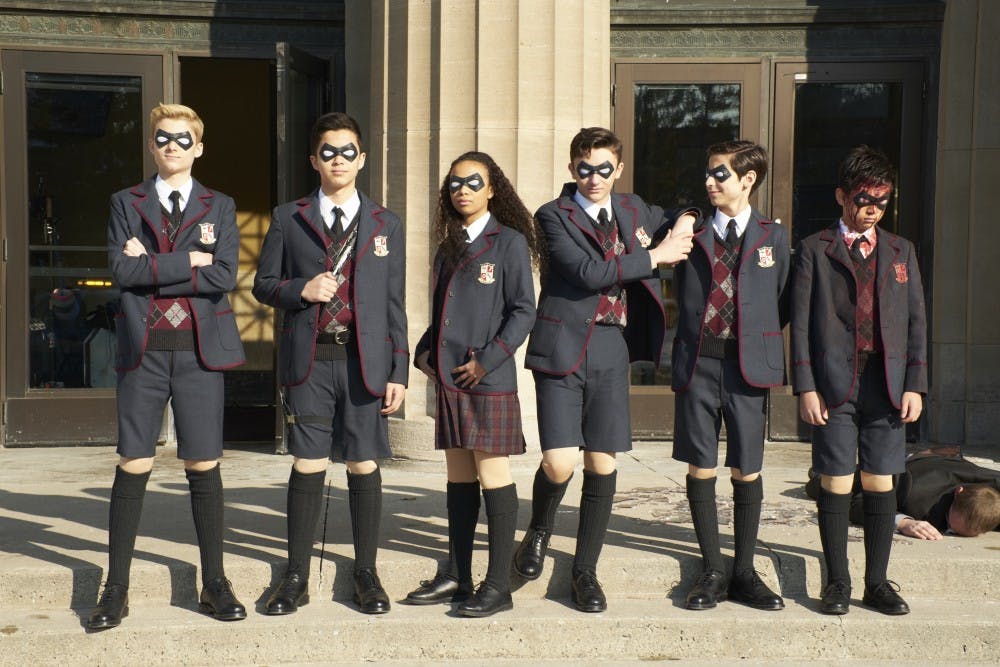The comic–to–screen phenomenon is in full swing, and the newest example is The Umbrella Academy, a new Netflix series that dropped on Feb. 15th. But in a world filled with the teen series cliches of Riverdale (still love it though), the action–packed saga of Marvel, and the spooky, satanic realm of The Chilling Adventures of Sabrina, the darkness and dysfunction of The Umbrella Academy offers a refreshing take on visual media inspired by comics.
Gerard Way, former lead singer of My Chemical Romance, wrote the comics that the series is based upon. The story chronicles the lives of seven children who have superhuman abilities and fight crime, but with a twist—it takes place once these children are all grown up (for the most part) and are relatively washed–up adults with familial tensions and cryptic pasts. There’s darkness, there’s violence, there are remnants of a former love story, and there’s upbeat music. What else would you expect from a punk–rock alternative artist's angsty brainchild? While the comics may sound similar to Suicide Squad, the two works are strikingly different. The Umbrella Academy is more like a mystery series. The creators successfully keep the audience on their toes by hooking us in with bizarre clips in the first minutes and leaving us with large questions by the end.
The story opens in a swimming pool in Russia during October 1987, presenting an scene that is unfamiliar, yet captivating. A young woman suddenly gives birth, even though moments before she was not pregnant. The same phenomenon occurs across the globe with 42 other women. The bizarreness only escalates when billionaire Sir Reginald Hargreeves (Colm Feore) purchases seven of these surprise children. By the fourth minute, the main characters are revealed to the audience through ambiguous clips: a hand watering a plant or a violin resting by a chin, accompanied by a montage of fast–paced, haunting Phantom of the Opera tunes.
The former members of The Umbrella Academy learn that their father, Reginald Hargreeves has died, and reunite at the mansion they once called home. The characters are named by number, indicating the lack of interest their father had for them. Played by Tom Hopper, Number One, or “Luther,” is marked by his gigantic physique and large wool grey peacoat, corresponding to his super–human strength; Number Two, or “Diego” (David Castaneda) is the only one of his siblings still fighting crime as a vigilante with superior knife–throwing skills; Number Three, or “Allison” (Emmy Raver-Lampman) is a glamorous actress, capable of convincing anyone into giving into her desires; Number Four, or “Klaus” (Robert Sheehan) can speak to the dead, but as an adult is haunted by substance abuse; finally, Number Seven, “Veshna” (Ellen Page) is, well, normal, or at least that’s what we think as of the first episode. Regardless, her normality has clearly created issues for her as a child—no one is free from the dysfunction that arises with the Academy.

With this roundup of characters you may wonder: what happened to Number Five and Number Six? This exemplifies the consuming power the creators have to keep you guessing and wanting more. Through the first episode you eventually learn that Number Five (Aidan Gallagher) traveled into the future, and did so before he received a human name. He comes back to the present, as the 13–year–old he was when he left, prompting the bigger question: what did he learn in the future and why is he back? Meanwhile Number Six, or “Ben” (Justin H. Min), who would have been able to release terrifying monsters from his body to wreak havoc on villains, is dead. But how? And by the end we learn, unbeknownst to the others, that Klaus can communicate with him.
As the dim lighting, intense music, and unique filming continues, more mysteries come to light. Villains from the future are trying to kill Number Five, and he reveals a damning secret to Veshna. The world is going to end in eight days, and they must find a way to stop it. It might be cliche to say that the most unlikely group of heroes are set to save the world—but these haunted, broken, and washed up heroes are anything but cliche. With sci–fi, mystery, and superheroes, the dysfunction and darkness that surrounds The Umbrella Academy brings the comic world to a fascinating new realm.







